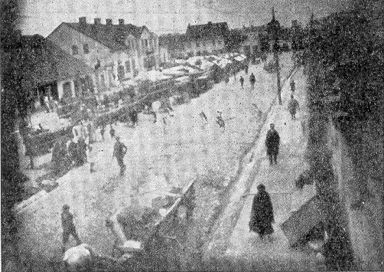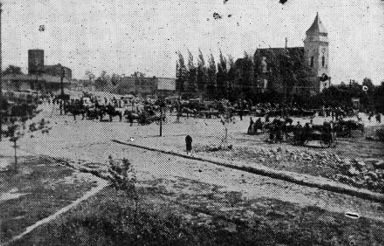![]()
Chaim-David’s
Shoemaker Shop
By J. M. [Jacob Meyer] Pukacz
(From the magazine Belchatow
Week [Belchatowski
Tydzien] No. 32/158
Translated into Polish, from the original Yiddish, by Szoszana Raczynska
Translated from the Polish by
Andrzej Selerowicz
[Edited by Jerry Liebowitz]
PART
1
[Daily life of a poor Jewish family in Belchatow]
There
were different and unusual buildings in Belchatow. Not one of them, however, was
similar to Chaim-David’s shoemaker shop in Pabianicka Street, to which you had
to climb up three short steps, leading to a tall, narrow glass door.
This
was not a shoe shop in the modern sense of the word. This was a rather poor
Belchatow abode where his entire belongings were placed together with the
children and working place. Countless articles and packaged goods were squeezed
in between the four dark walls, and remembering and keeping track of them would
have required the memory of a Minister of State. There were no windows in the
narrow, gloomy room. The little bit of sunlight came through the glass door,
although there was almost always somebody standing there, watching pedestrians
walking down the narrow stone sidewalk of the paved Pabianicka Street.
Just
to the right of the entrance stood two seldom made beds one after another. Next
to the first one stood a spinning wheel which was used by the children, Mendel
or Pesha. In a corner of the room across from the second bed was a cast iron
stove on which the modest food, mostly potatoes as in many of Belchatow’s
houses, was cooked.
In
the wintertime a kettle with boiling water always stood there. People took water
and mixed it with a bit of chicory and a piece of hard Polish sugar.
On
the other wall, a small cupboard stood near the kitchen table, and another
larger table, permanently covered with books, notebooks, newspapers, magazines,
shoes, slippers, galoshes, wooden shoe forms, and other paraphernalia. Closer to
the door there was the workbench with a three-legged stool, where shoemaker,
Chaim-David, used to sit, dream, play the philosopher and work. On the other
side, near the door, a bench stood for customers, guests or simply loafers,
where also Szprynce (mother) mostly sat and read out loud a book, newspaper, or
magazine. This kind of close quarters was characteristic for the majority of
Belchatow’s inhabitants.
In
the weaving workshops, for example, two or three looms filled up almost the
entire space of the house so that all other household utensils were incredibly
squeezed together. This lack of space led to some comic episodes. I remember one
of them:
[A comic episode]
The
shoemaker, Chaim-David, was a great fan of noodles. His wife, Szprynce, decided
once to make noodle dough. But she had only a handful of black rye flour, and
no eggs. But where is it written that eggs are necessary to make noodle dough?
So she kneaded the dough using water, rolled it out and put it out to dry on the
bench. In the meantime a neighbor lady, who was a bit near-sighted, came for a
visit, and sat down at the bench where the dough was placed. A few minutes
later, she stood up with the dough sticking to her dress. On that day Chaim-David wasn’t able to enjoy noodles and his noodle dream went up in
smoke.
[Magazines and Newspapers]
The
working day started at eight in the morning, and the evening went on and on,
sometimes until midnight. The first chores to be done in the morning belonged to
Mendel, the son. He went to the post office to fetch newspapers and magazines,
which had been sent to Chaim-David’s address from all over Poland.
Chaim-David
had a special way of getting Jewish and Polish magazines without paying the
subscription costs. Even if he wanted to pay he couldn’t because he did not
have any money. He wrote to various editorial offices as an unemployed person
who despite his condition wanted to read their magazines. And so he received
them free of charge.
In
this way the shoe shop became probably the one and only place in Belchatow which
subscribed to “Gazeta Polska”, “Wiadomosci Literackie”, “Kurier
Poranny”, “Robotnik”, “Folks Cajtung”, “Hajnt”, “Der Frajnd”,
“Literarisze Bleter”, “Literarisze Tribune” and many others which were
printed in Poland in the 30s.
And
when you get a package of newspapers, you should read them! So Chaim-David put
away his hammer, spit the nails out of his mouth, left a shoe on the tripod and
started reading and commenting on happenings described in the newspapers. But
one can not make money for a living by talking and commenting. No amount of
persuasion and arguments would help. Chaim-David read more then he worked, and
there was still no money in sight. Szprynce had a fantastic idea: “Why should
you read and not work? From this day on, I will read to you out loud and you
will work.” And so it was. This lasted for years and brought peace into their
lives and money as well.

One of Belchatow’s streets, 1930.
[Note:
This same photo is titled "The old market in Belchatow, as it looked in
1930"
in the Belchatow Anniversary Publication of the Mutual Aid
Society of Belchatow
and Its Surrounding Areas (1959), page 11.]
PART 2
[The Cinema]
Chaim-David
Kaufman had another passion – the movies.
There
was one movie theater in Belchatow called “Polonia”. Three times a week:
Fridays, Saturdays, and Sundays, movies were shown in two performances.
Every
Friday, without compromise, even if the world would come to an end, Chaim-David,
Szprynce, and their four children went to the movies and watched both films.
Until 1936 only silent movies were shown in Belchatow.
My
friend, Mendel, had a talent to tell stories. He could describe the whole movie,
even particular scenes. In those times, the entire movie art revolved around
Douglas Fairbanks (father), Charlie Chaplin, Valentino, Ramon Novaro, and Greta
Garbo. You will surely ask, how one could afford such an expense like going to
the cinema every week under such a difficult economic situation? Chaim-David
found a solution. Frankly speaking he did not have any money, so he agreed with
the movie theater owner, Janek Rybak, (he was his neighbor, as the movie theater
was also in Pabianicka Street) that he would allow him to enter “on credit”
and the money would be paid back in the form of various shoe repairs and new
soles for the entire Rybak family. Who owed whom money was never a grounds for a
disagreement, and cash was never used to pay off debts. Only by one more movie
performance or the repair of one more pair of worn out shoes. In such poverty -
but what a high spiritual level - four successful children were raised and
educated.
[Political (and religious) tolerance]
One
more characteristic has to be noted of the Kaufman family: The tolerance and
mutual trust towards each other. It was no secret for anybody in Belchatow that
the Kaufmans belonged politically in the left spectrum. They themselves did not
hide this and often told their opinions in discussions about local and general
problems. However when Mendel one day came home and expressed his wish to join
the religious organization “Shomer Hadati” they started to discuss this
topic, but nobody tried to hinder his plan. After a certain time, I saw Mendel
wearing the bright green uniform of “Shomer” and a round cap with a
blue-white brim. Mendel probably remained a student of this school for several
years. He learned Hebrew, went for excursions, and once even got a prize for the
recitation of the part “Motl-Pejsi the Cantor’s Son” during a cultural
evening.
Chaim-David
and Szprynce were extremely happy when Mendel brought home a bar of chocolate
and a bag of candies as a prize for his successful performance.
[Baking matzoth in the new house]
I
left Poland at the end of 1937 and traveled to Argentina. In the first years of
my stay – as every immigrant – I yearned for Chaim-David’s shoe shop and
sent him letters. At the end of 1938 Chaim-David left his flat and moved to the
old house of the Moszkowicz family, also in Pabianicka Street. This new flat was
a part of the inherited house where Szprynces’s sister, Rywa, already lived
with her husband (also a shoemaker) and children, as well as her two brothers,
Peszek and Szlomo-Lejb with their families.
Both
of Szprynce’s brothers, average and peaceful workers, earned their living from
three different types of handwork. In the winter time they were weavers, in the
summer they kept the orchard, and between the holiday of Purim (end of
February/beginning of March) and Easter they baked matzoth. The oven for matzoth
faced the street. Every year they baked matzoth there and had a large group of
regular customers, among the poor people of Pabianicka Street. The process of
baking matzoth was connected to a ritual and started a long time before Purim.
In the room where the oven stood, Rywa and her husband usually lived, and so it
was necessary to find them another place to stay for a period of two months.
Only then began the cleaning, preparation, purifying and kashering of the oven.
The whole Moszkowicz family was involved in the baking of the matzoth. The
hierarchy and standard of work had been set down for years. There were the
persons who mixed the ingredients, and those who kneaded and rolled out the
dough. Mendl and I also had our duties and earned a couple of groschy profit as
well as some kilos of matzoth for Passover, which my mother wrapped in a clean
pillow case and hung it from a hook in the ceiling.
During
the Nazi occupation, Mendel and Jakob Cyngler [Tsingler] hid and cemented the books from
the library in the oven. What destiny became the books after the liquidation of
Jews in Belchatow remained a secret, and nobody has tried to find out what
happened. Probably it will never be clarified.
[Tragic Epilogue]
Life
in the new flat did not last long. Here we approach the end of the memories of
the epilogue of the Jews in Eastern Europe. In September 1939 Hitler invaded
Poland. On the third day of the war, Belchatow was occupied by Nazis, and that
was the beginning of the end.
Chaim-David
was one of the first victims of the Nazi occupation. Together with a group of
other Jews from Belchatow, he was deported to a work camp in Poznan where he
perished.

Belchatow before the war – view of the Old Market (today: Narutowicza Square).
J. M.
Pukacz
Translation from Yiddish by Szoszana Raczynska
[Permission to translate and reprint this
article was granted by the author, who has lived in Argentina since 1937.]